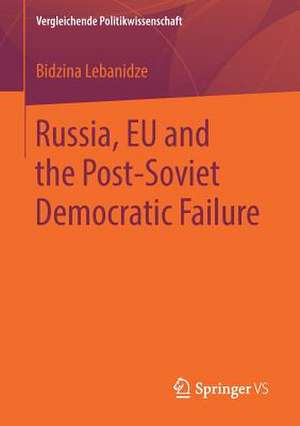Russia, EU and the Post-Soviet Democratic Failure: Vergleichende Politikwissenschaft
Autor Bidzina Lebanidzeen Limba Engleză Paperback – 25 mai 2019
Din seria Vergleichende Politikwissenschaft
-
 Preț: 344.52 lei
Preț: 344.52 lei - 13%
 Preț: 478.78 lei
Preț: 478.78 lei -
 Preț: 399.67 lei
Preț: 399.67 lei - 15%
 Preț: 583.13 lei
Preț: 583.13 lei -
 Preț: 419.81 lei
Preț: 419.81 lei -
 Preț: 323.07 lei
Preț: 323.07 lei -
 Preț: 491.01 lei
Preț: 491.01 lei -
 Preț: 460.52 lei
Preț: 460.52 lei -
 Preț: 352.25 lei
Preț: 352.25 lei -
 Preț: 429.61 lei
Preț: 429.61 lei -
 Preț: 491.98 lei
Preț: 491.98 lei -
 Preț: 323.84 lei
Preț: 323.84 lei -
 Preț: 495.84 lei
Preț: 495.84 lei -
 Preț: 499.72 lei
Preț: 499.72 lei -
 Preț: 358.06 lei
Preț: 358.06 lei - 15%
 Preț: 494.68 lei
Preț: 494.68 lei - 15%
 Preț: 441.19 lei
Preț: 441.19 lei - 15%
 Preț: 587.20 lei
Preț: 587.20 lei - 15%
 Preț: 506.29 lei
Preț: 506.29 lei - 15%
 Preț: 599.17 lei
Preț: 599.17 lei - 15%
 Preț: 479.22 lei
Preț: 479.22 lei - 15%
 Preț: 494.68 lei
Preț: 494.68 lei - 15%
 Preț: 440.21 lei
Preț: 440.21 lei - 15%
 Preț: 471.37 lei
Preț: 471.37 lei
Preț: 640.37 lei
Preț vechi: 753.39 lei
-15% Nou
Puncte Express: 961
Preț estimativ în valută:
122.53€ • 128.30$ • 101.63£
122.53€ • 128.30$ • 101.63£
Carte tipărită la comandă
Livrare economică 09-23 aprilie
Preluare comenzi: 021 569.72.76
Specificații
ISBN-13: 9783658264451
ISBN-10: 3658264454
Pagini: 329
Ilustrații: XV, 329 p. 40 illus.
Dimensiuni: 148 x 210 mm
Greutate: 0.42 kg
Ediția:1st ed. 2020
Editura: Springer Fachmedien Wiesbaden
Colecția Springer VS
Seria Vergleichende Politikwissenschaft
Locul publicării:Wiesbaden, Germany
ISBN-10: 3658264454
Pagini: 329
Ilustrații: XV, 329 p. 40 illus.
Dimensiuni: 148 x 210 mm
Greutate: 0.42 kg
Ediția:1st ed. 2020
Editura: Springer Fachmedien Wiesbaden
Colecția Springer VS
Seria Vergleichende Politikwissenschaft
Locul publicării:Wiesbaden, Germany
Cuprins
Regime outcomes and degree of democracy in the post-Soviet states.- Domestic prerequisites for democratization.- Russia, EU and their vulnerable neighbors: Measuring the external leverage in the post-Soviet states.- Between neighborhood and colony: European and Russian strategies in the post-Soviet space.- Direct external influence: Elections in the post-Soviet states.
Notă biografică
Bidzina Lebanidze is Research Associate at the University of Bremen and Associate Professor (of International Relations) at the Ilia State University.
Textul de pe ultima copertă
By studying the influence of the two main external actors in post-Soviet space, the EU and Russia, this study contributes to the increasing body of literature that studies the causes of democratic recession and authoritarian backlash in post-Soviet states and the role of regional actors in these processes. Empirically, the study finds the EU to be both a democracy-promoting and democracy-hindering actor in post-Soviet states. Russia’s impact, on the other hand, is far more negative than the literature on democratization and autocracy promotion typically suggests. It negatively affects both the quality of democracy of post-Soviet states and limits the EU's options for promoting democracy in its neighborhood.
Content
- Regime outcomes and degree of democracy in the post-Soviet states
- Domestic prerequisites for democratization
- Russia, EU and their vulnerable neighbors: Measuring the external leverage in the post-Soviet states
- Between neighborhood and colony: European and Russian strategies in the post-Soviet space
- Direct external influence: Elections in the post-Soviet states
Target Groups
- Scholars and students of democratization, European politics, Europeanization and post-Soviet politics
- Policy practitioners working on democratization, post-Soviet region, European foreign policy, ENP, EaP and Russian foreign policy
Author
Bidzina Lebanidze is Research Associate at the University of Bremen and Associate Professor (of International Relations) at the Ilia State University.
Caracteristici
Study in the field of political science
